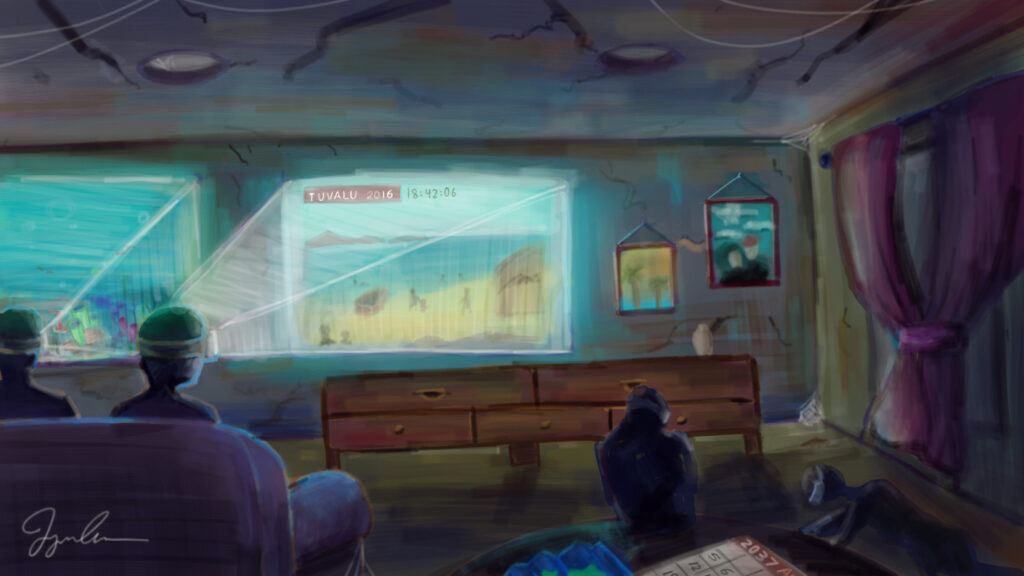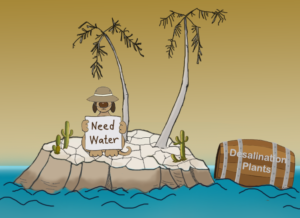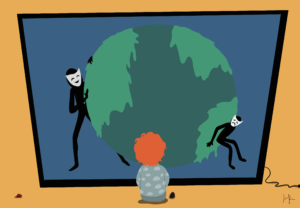
Human culture across Earth is rich beyond imagination. While some practices naturally shift, transform, or become obsolete with time, many ways of life and chapters of human stories are directly marred or lost at the hands of climate crises. Today, we see many of these cultures in danger of being lost.
Heritage sites are one such example. Areas with historical buildings, monuments, and indigenous people hold memories and celebrations of past and present culture. This brings a sense of identity and vibrance to communities. Yet when climate crises, such as temperature change, natural disasters, and rising sea levels affect a geographic region, direct consequences occur. Whether these consequences decrease tourism, wither local practices, or harm communities of people, some cultural aspect is always lost.
During the 2022 United Nations Climate Change Summit, Simon Kofe, the foreign minister of Tuvalu, an island country in the South Pacific expressed a gave reality for the future of the country.
In an attempt to preserve remnants of the country’s culture and history, Tuvalu intends on becoming the first country to exist in the Metaverse with digital space the only option for the state’s existence as the island continues to be among the first to submerge below rising sea levels. Due to this phenomenon, generations of people are forced to flee their cultural identity and watch their history sink, only to be half-salvaged in digital spaces.
A common argument among those who do not see climate change as a threat is that future generations will simply adapt and change. Whether this adaptation is likely or not disregards how these changes could be partially a consequential result of human negligence. This mentality of complacency forces future generations to experience the brunt of these consequences and make heartbreaking changes like shifting a country from its shores to virtual reality where culture no longer tangible. Just because humans can adapt, doesn’t mean those adaptations are positive or should be regarded as simply imminent and requiring no early advocacy or action.
Though Kofe states, “The idea is to continue to function as a state and beyond that to preserve our culture, our knowledge, our history in a digital space,” attempts to save human culture like that on the island of Tuvalu through digital recreation are, of course, not fully encompassing. Aspects like generational stories, local people, and food cannot be digitally recreated. These are cultural ideas that will be lost with time as the country succumbs to rising sea levels, and visiting Tuvalu in the Metaverse becomes a grave reminder of climate crises, not a novel way to experience culture.
The physical deterioration of a country not only affects its own people, history, and culture, but it also causes problems beyond its domestic borders. Sovereignty becomes unclear, international laws are questioned, and the loss of one region can greatly affect neighboring regions. These include physical effects like trade, the sharing of ideas, and cross-national relations. The branching effects of cultural loss due to climate crises are extensive.
A region’s culture can be described by what it’s known for. For example, Southern California is known for its stunning beaches, surfing, and tourism. Features like these foster a rich culture in the region. When cornerstones of culture are marred by climate deterioration, the effects can depress a region.
One such phenomenon is seen with the coral reefs off the coasts of Florida and Queensland in Oceania. As ocean temperatures rise, coral reefs are bleaching and dying of disease.
As researchers have stated, “A rapid decline in the world’s coral reefs could damage economies that rely on underwater sea life for tourism revenue … Tourists spend billions of dollars each year on hotels and tours to experience the marine habitats in areas including the Caribbean, Australia and the Pacific islands.”
The practice of tourism itself can become a cultural staple. However, environmental crises like the mass bleaching and death of coral reefs can have broad effects, such as a decline in tourism, hardships in local fishing communities, and a loss of natural beauty in the area. The coasts lose attraction and the local economy can pick up and flee, leaving a forgotten culture of human experience.
Natural disasters caused by climate degeneration can quite literally wipe out communities as well. Evidence suggests that climate change exacerbated the Hurricane Katrina disaster of 2005.
The effects of this crisis had permanent effects on culture across affected coastal communities.
When visualizing the cultural aftermath following Hurricane Katrina, despite attempts to rebuild attractions in New Orleans, “High-water marks scar the exteriors of abandoned buildings, reminding visitors and residents alike of the uncomfortable truths about Hurricane Katrina and the many displaced people who continue to wait to reclaim their homes” (Mann et al. 2011). The effects of climate crises are long-lasting and interfering.
Sightseeing, adventure, and travel are often based on the environment and geographical features. Unfortunately, with recent climate effects such as natural disasters, environmental decay, rising sea levels, and unstable temperatures, cultural experiences face imminent danger. To preserve the environment is to preserve tourism and culture.
Do not be complacent in creating a future where mass cultural death occurs at the hands of man-made climate change, and the most beautiful parts of nature become memories eventually forgotten.
The views and opinions expressed are those of the authors and do not necessarily reflect nor represent the Earth Chronicles and its editorial board.








